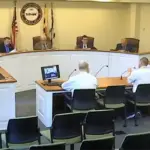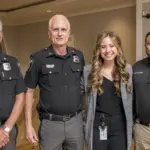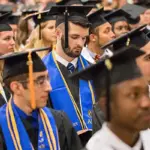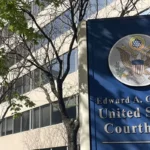by Marc Shapiro, photography by Bill Ryan
When a Carroll County high-schooler’s father died suddenly of a heart attack, he didn’t know where to turn. So he called Chris Sturdivant, the Fellowship of Christian Athletes’ area representative for northern and western Carroll County.
“I ended up helping him walk through that situation. I even did his father’s funeral,” Sturdivant recalled. “But I had no idea I was making that kind of impact in that kid’s life. … Sometimes God shows us.”
Moments such as these keep youth pastors like Sturdivant going in a world where youth ministries can fall prey to being just another item on teenagers’ never-ending list of extracurriculars. But he thinks teens’ increasingly busy lives, which are being constantly broadcast on social media, make them perfect subjects.
“I think that kids are missing that very important piece of authentic relationships in their lives,” Sturdivant said.
What results is an ever-evolving church and youth ministry that needs to respond to an era of declining religiosity in America, a culture that doesn’t revolve around the church the way it used to, and kids’ changing priorities.
Sturdivant is one of a group of county youth pastors who converge in Young Life Carroll County, a parachurch organization that goes to kids, rather than the opposite.
“Our leaders, who are trained, spend a lot of time in schools, go to games, events … Chick-fil-A, places where kids gather, to just meet kids,” said Matt Michael, area director for Young Life Carroll County. “And our mission is to introduce kids to Jesus Christ and help them grow in their faith.”
Michael said Young Life emphasizes reaching out to the kids who are “furthest out” — there are ministries for special needs individuals, teen moms and middle-schoolers. But for a group that Michael gathered in November to discuss Young Life, high school students are the focus. In its 2017-2018 year, the organization engaged 175 high school kids at events weekly.
None of the Young Life leaders are seeing any kind of long-term decline in attendance, but rather a drop-off between freshman year and senior year of high school.
“I know there’s a lot to it … but the freedom component, the fact that it’s their choice, not their parents’ or someone else’s choice, is certainly a factor,” said Jono Contestabile, student ministries director at Crossroads Church in Westminster. “I think they definitely get busier.”
The FCA and Young Life try to mitigate this through their outreach. And although some may drop off, many may come back later in life if the foundation is there.
Perhaps it is Young Life’s somewhat unorthodox methods that are shielding the organization from a nationwide trend of declining religious involvement.
According to the Pew Research Center’s 2014 Religious Landscape Study, 36 percent of American adults attend a religious service once a week, compared with 39 percent in 2007. In Maryland, that number shrank from 38 percent in 2007 to 31 percent in 2014. There were also declines in frequency of prayer nationwide and in Maryland.
While these figures may not necessarily reflect religiosity in youth, experts are seeing similar trends in adolescents.
“This whole question of decreasing engagement of youth and young adults in the life of the church has risen to a level of acuteness that is being paid attention to by a good number of folks right now,” said Mark DeVries, president and founder of Ministry Architects, a Brentwood, Tenn.-based company that helps youth ministries build sustainable programs. “What they’re finding is doing more of what they used to do is not working for them. … We’re just living in a whole different world.”
The busyness Contestabile referred to results in a more fragmented identity, DeVries said.
“Historically, religion has been that place that gave meaning and value and a common narrative to who we are,” he said. “And so, what’s happening is because religion is increasingly becoming for adolescents one more piece of the patchwork of identity, it’s not an integrated one, not a holistic one, it’s more of almost a competing one. Those sort of sweeping changes in the culture have really impacted the church.”
But DeVries calls this “tremendously good news” because when the church was the dominant culture, it was on autopilot. Being active in a faith community is a choice now, not the default.
Tom Zeller, religious education coordinator at Cedarhurst Unitarian Universalists in Finksburg, said Unitarians are actively discussing how to remain relevant in changing times.
Recently, Cedarhurst has held “Reimagining Sunday” once a month, where rather than a traditional service, a short church-wide program is followed by group activities that can include crafts, letter-writing, a social justice project or walking meditation.
But the weekend retreats are the highlight for Cedarhurst kids.
“For many of our kids, they may be the only one in their high school that is a Unitarian,” he said. “For some kids it is truly the thing … that is most important to their life. And for some of them, quite frankly, it is what saved their life. It is why they are alive because they actually found a community at a time when they didn’t think such a thing would exist for them.”
In 2018, Unitarians reported the first increase in U.S. membership since 2008, although religious education enrollment continues to fall, according to UU World, the magazine of the Unitarian Universalist Association. The modest increase of 0.67 percent follows a 4.95 percent decline over the past decade.
At Faith Family Church in Finksburg, student and family pastor Tony Trussoni is finding that youth are more interested in service-oriented events. He wonders if the oft-dreaded smartphones are actually helping.
“Maybe [they have] more awareness of the world around them, and they experience the worldview of their classmate,” he said. “It forces people to have more of an outward focus.”
While Sunday and Wednesday classes are well-attended, Trussoni said attendance of a winter retreat has gone down substantially, and while membership is relatively steady, he’s not seeing younger families staying involved the way they used to.
“In the past, there was more of a sense of cultural Christianity. To be American was to be Christian,” he said. “Now there’s a more open worldview, which I think is a good thing … as much as it’s caused smaller numbers of people to come to things.”
Rabbi Sholly Cohen of the Chabad Jewish Center of Carroll County, which is in its fifth year, sees program attendance growing. Chabad, an international Jewish outreach organization, appears to be connecting previously unaffiliated members of Carroll’s Jewish community. The school year started with 30 kids coming to Cohen’s programs, and by December he had nearly 50 registered for his next event.
Whether it’s making menorahs at the Eldersburg library, holding a public menorah lighting on Main Street Sykesville for more than 200 people on Hanukkah, or involving teens in High Holiday services, Cohen is always looking to engage the youth in a hands-on way.
“[It’s] in order to create a feeling for religion and feeling toward others in an active, real way,” Cohen said. “Sometimes it’s hard to get the children to come around, but the second they’re there, they can’t wait to come back.”
These kinds of out-of-the-box tactics are what DeVries says are working. Religious communities should be constantly prototyping and not afraid to fail, he said.
“There’s just all kinds of very creative things going on out there, but they don’t often look like ‘let’s get in a room together, let’s play and sing a bunch of songs and I’ll read some Bible verses and we’ll talk about it,’” he said.
He pointed to ministries that have businesses built into them — fishing, mowing lawns and selling (no joke) worm excrement as fertilizer.
In the case of Young Life, which DeVries said are “pioneers in this field in so many ways,” events like blacklight dodgeball and mud football are what reel in kids.
“I do believe there’s a spiritual side of it. Like, ‘OK, I need more of this.’ And maybe at that point they don’t even know what ‘this’ is,” said Patrick Boyd, youth pastor at Uniontown Bible Church in Union Bridge. “So, it’s not some ‘I went to an event’ but ‘I went the Mudbowl thing. I was gonna play football, and God changed my life.”













